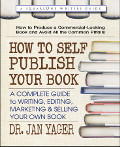 Techniques for overcoming your procrastination about finishing your book.
Techniques for overcoming your procrastination about finishing your book.
Note: This blog is a shortened and edited version of a longer article on this theme, originally posted at www.indiereader.com
Yes, there are lots of valid reasons to take more time to finish your book. You’re really still writing it. You need to do more research that is vital to your book. You need to put it aside and return to it with a fresh eye. You’re exhausted from working all week and need to relax on the weekends, not work on your book.
But there comes a time when you have to face the music and realize that you’re actually putting off finishing your book because you’re procrastinating.
If that’s the case with you and your book, here are some suggestions that might help you break through your “finishing block” so you can go to the next step with your book, e.g. getting published:
- Reward yourself for finishing the book.
Yes, if you have a publisher, you will hopefully be rewarded with an acceptance and even the second part of your advance, but whether or not you have a publisher for your new book, reward yourself for completing it. Pick something that means something to you and make a commitment to making that happen once you finish your book. Buy tickets to a Broadway show you’ve been putting off because you didn’t want to make plans until your book was finished. Or promise yourself that you’ll go on that weekend trip that you’ve been putting off. Perhaps you’ll take a cooking course or donate your time at a homeless shelter because you won’t have “the book” taking up all your time and energy. - Write down a list of pluses for finishing your book.

Make a list of as many of the positive results of completing your book that you can think of and put it in a prominent place in your office. For example, a renowned sociologist wrote to me, when I wrote to him and told him that I had finally finished my dissertation – I’m paraphrasing what he wrote, but this is the core of it — to note that at the very least, I wouldn’t have to explain to anyone why I was still working on my dissertation. The same is true of books. If you finish, you don’t have to keep explaining to everyone why you’re still working on that book! - By finishing, you avoid becoming so bored with the book that you put it aside forever.
To finish a book, you need a momentum. Here’s the challenge: to start, continue and finish a book-length project, you also need to pace yourself. Although I wrote the first draft of two of my novels in a week and a weekend, respectively, the editing and rewriting took weeks and even years to finish each book. But the key is to keep with a project, for as long as it takes, to complete the book. That could be days, months, or years. Avoid putting your book aside for too long or it may languish forever or, especially in the case of non-fiction works that are timely, it could become stale and out-of-date before it’s even published. - Don’t let perfectionism stop you from finishing.
Yes, it’s good to have high standards and to strive for excellence. But at a certain point, revising and rewriting is really perfectionism in disguise. Know when reworking your book is necessary and when you are becoming so perfectionistic you’re stopping yourself from finishing. If it’s the later, tell yourself it is time to let go of this book, and move on to the next project. - Imagine the worst thing that could happen if you finish your book, and see yourself surviving it.
What do you dread the most about finishing your book? Getting a negative review on amazon.com? Putting in all this work and getting great reviews but meager sales?
For every book author, there will be a different fear, or two. The key is for you to take the time, if you’re having a problem with finishing a particular book, to sit down and doing some self-talk about your worst fears that may be stopping you from finishing.Then see yourself overcoming those fears. A bad review on amazon.com? Okay, it happens, from time to time. But you will get over it. If the majority of the reviews are positive, hopefully the negative one won’t carry as much weight as you’re giving it in your mind to the point of letting it stop you from finishing and publishing your book. - Please yourself first.
A useful rule of thumb in writing books is to first please yourself. If you’ve pleased yourself – and of course, if you set and achieve very high standards for yourself – then you will be more secure about the book you are finishing and less traumatized by a fear of what your editor, the public, or critics will think of it. - Every book is a separate project.
They used to say in the book publishing world that it’s harder to get a second book published than a first one. That’s because when you publish your first book, you’re that “first-time author.” No expectations. Nothing to compare it to. But once you’ve published one book, now you’re a second time author who is also the author of that previous book, for better or worse.Forget about those comparisons! Every book stands on its own, even if it’s part of a series. Don’t let the comparisons that others might do about you and your various books slow you down or even stop you in your tracks from finishing this new book. Treat every book like a self-contained project. (It’s like the parent of more than one child. When asked who is their favorite child, they will hopefully answer, “Both,” or “Each one.”) - No one cares as much as you do about this book getting finished.
You need an internal pressure to keep going and to finish your book. Of course if you have signed a contract with a publisher, and gotten an advance with a deadline, there may be external pressures on you to get done. But even those realistic demands are not as powerful as having the inner drive to see this book to publication. - “I don’t have time to write.”
Fortunately, I already explored solutions to this typical reason for not finishing writing a book in a previous article published at www.indiereader.com, Making the Time to Write. I suggest you read that article for some solid tips if feeling like you lack the time to write is yourparticular reasonfor not yet completing the particular manuscript that’s sitting on your desk or as a file in your computer. - Allow for reasonable delays.
Yes, I am suggesting that sometimes you have to put that book aside and return to it hours, days, months, and, in rare instances, even years down the road. The big challenge is knowing when those delays are in the service of your book and not just procrastination because of your reluctance to finish. Here’s the tricky part. You can’t force passion and, even with creative nonfiction, passion will help your writing to sing and soar and not be mundane and boring. So if you have to take a few hours off to walk the dog, recharge your batteries by getting together with friends, or reconnect with your romantic partner, it just might help your writing.
So you have to be the judge of whether or not you will allow for delays. If your friends and family understand how huge the challenge is of finishing a book, they will understand if you can’t get together as often because you’re committed to finishing your book.
Good luck finishing your book! Whether it’s your first book, your second, or your forty-second, finishing a book takes commitment, courage, and dedication. I am reminded of that adage, “No guts, no glory.” Those wise words are definitely true when applied to the monumental task of finishing a book.

Jan Yager, Ph.D. is a sociologist, coach, and the prolific award-winning author of more than 40+ award-winning books translated into 32 languages. Her nonfiction titles include: When Friendship Hurts; Work Less, Do More (3nd edition); Put More Time on Your Side; Friendshifts; 365 Daily Affirmations for Happiness; Productive Relationships; and others. Her fiction includes: Untimely Death; Just Your Everyday People; and The Pretty One. Her most popular journals are Birthday Tracker and Journal and Friendship Thoughts, Famous Quotes, and a Journal.  The author of Effective Business and Nonfiction Writing, Jan taught writing nonfiction as a visiting professor at Penn State. She is now an Adjunct Assistant Professor in the Department of Sociology at John Jay College of Criminal Justice/CUNY. Contact Jan by e-mail at jyager@aol.com if you’re interested in coaching or to when she’s offering webinars or seminars on her areas of expertise related to writing including finishing your book; finding an agent; getting published; or selling foreign rights.
The author of Effective Business and Nonfiction Writing, Jan taught writing nonfiction as a visiting professor at Penn State. She is now an Adjunct Assistant Professor in the Department of Sociology at John Jay College of Criminal Justice/CUNY. Contact Jan by e-mail at jyager@aol.com if you’re interested in coaching or to when she’s offering webinars or seminars on her areas of expertise related to writing including finishing your book; finding an agent; getting published; or selling foreign rights.